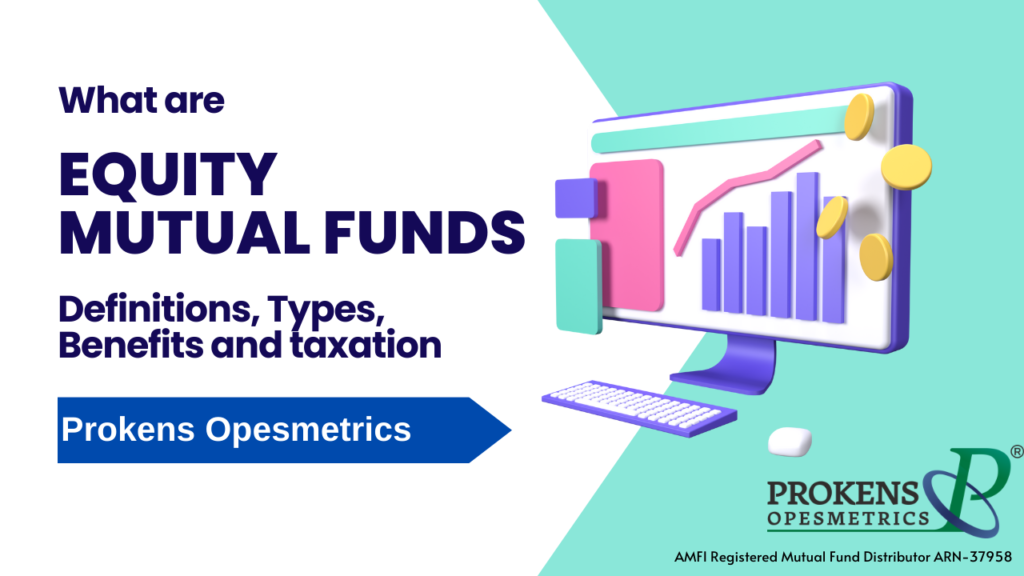What are Equity Mutual Funds! Different Types, Benefits and Taxation in Equity Mutual Funds.
What are Equity Mutual Funds! Different Types, Benefits and Taxation in Equity Mutual Funds.

Equity Mutual Fund
Mutual fund pools money from thousands of investors to create a diversified portfolio of marketable securities. An equity mutual fund is a type of mutual fund that primarily invests in stocks or equities of publicly listed companies. The fund manager or a team is responsible for selecting the stocks based on the fund’s investment objectives and strategies. The main goal of an equity mutual fund is to generate capital appreciation over the long term by investing in a diversified basket of stocks. Investing in an equity mutual fund allows individual investors to gain exposure to a wide range of stocks, even with a relatively small amount. It also benefits from professional fund management, as the fund manager is responsible for researching, analysing, and making decisions on the stocks within the portfolio.
Types of Equity Mutual Funds
There are different categories of equity mutual funds. The below-given explanation will help you to understand the categories better.
Investment Strategy-based Categorization
- Thematic or sectoral mutual funds: Thematic or sectoral funds are mutual funds that focus their investments on specific themes or sectors of the economy. These funds invest in companies that are part of a particular sector, trend, or development rather than having a broader diversification across various industries.
- Focused equity funds:They maintain a concentrated portfolio of limited stocks. Unlike classical equity funds that typically hold larger stocks to achieve diversification, focused equity funds intentionally have fewer holdings, often ranging from 20 to 30 stocks.
- Contra funds: These follow a contrarian investment strategy. Contrarian investing involves taking positions that are opposite to the prevailing market sentiment. In a contra-equity mutual fund, the fund manager seeks out and invests in stocks currently out of Favor or undervalued by the market.
- Value Funds: Such funds identify stocks trading at prices below their intrinsic or fundamental value. Here fund manager buys the stocks undervalued by the market, expecting their prices to rise as the market recognizes their true worth eventually.
Market Capitalization-based Categorization
- Large-Cap Funds: These funds invest in India’s top hundred large-cap companies. Such companies are well-established with a proven track record. At least 80% of the total assets in a large-cap fund should be invested in such equity shares. These first hundred companies have a relatively large market capitalization and are considered relatively stable compared to the stocks of other market capitalizations.
- Mid-Cap Funds: Mid-cap funds invest in the stocks of medium-sized companies with the potential for higher growth than large-cap companies but may also come with higher risk. The universe to select the stocks is from India’s 101st to 250th companies in the order of market capitalization. Mid-cap funds invest around 65% of their total assets in equity shares of such mid-cap companies.
- Small-Cap Funds: Small-cap funds invest in stocks of companies with a smaller market capitalization. These funds aim to capture higher growth potential but can be more volatile than those that invest in large and mid-cap companies. The funds under this category generally invest around 65% of their total assets in equity shares of small-cap companies, ranked 251 and below by market capitalization.
- Multi-Cap Funds: Multi-cap funds can invest in companies across the entire market capitalization spectrum, including large-cap, mid-cap, and small-cap stocks. The fund manager adjusts the allocation based on market conditions and investment opportunities and usually invests around 65% of the total assets in different stocks. Each market capitalization should necessarily receive an allocation of 25% of the assets under management (AUM).
- Large and mid-cap fund: Large and mid-cap funds invest in large and mid-cap companies. These funds can allocate their assets between large-cap and mid-cap stocks, exposing investors to companies of varying sizes and growth potential. Such funds usually invest around 35% of the total assets in equity shares of mid-cap companies and 35% in large-cap companies.
- Flexi Cap Fund: These funds have the flexibility to invest in stocks across different market capitalizations, including large-cap, mid-cap, and small-cap companies. This flexibility allows the fund manager to adjust the portfolio allocation based on market conditions and investment opportunities. Here, the fund manager plays a crucial role in making investment decisions on market trends, economic conditions, and company-specific factors.
Tax-Exemption-based Categorization
Equity Linked Savings Scheme (ELSS): Funds under this category primarily invest 80% of their total asset in equity and equity-related instruments of companies across various sectors with a mandatory lock-in period of three years. Investments made in ELSS funds are eligible for tax benefits up to 1.5 lakhs per annum under Section 80C of the Income Tax Act.
Investment Style-based Categorization
Active Fund: An active mutual fund is a mutual fund where the fund manager actively manages the portfolio by selecting and buying individual securities (such as stocks, bonds, or other assets) based on their research, analysis, and market predictions. The primary objective of an active mutual fund is to outperform a specified benchmark or achieve a specific investment objective.
Passive Fund: A passive mutual fund, also known as an index mutual fund, aims to replicate the performance of a specific market index or benchmark. The primary objective of a passive mutual fund is to closely track the returns of the chosen index rather than attempting to outperform it through active stock selection.
Benefits of Investing in Equity Mutual Funds
Investing in equity mutual funds offers several benefits, making them a popular choice for new and experienced investors. Here are some of the key advantages of investing in equity mutual funds:
- Diversification: Equity mutual funds invest in a diversified portfolio of stocks across different sectors, industries, and market capitalization. This diversification helps reduce risk by spreading investments across various companies, reducing the impact of any stock’s poor performance.
- Professional Management: Equity mutual funds are managed by experienced fund managers or investment teams who conduct in-depth research and analysis to select the best-performing stocks. Investors benefit from the expertise and knowledge of these professionals, especially if they lack the time or expertise to pick individual stocks.
- Liquidity: Mutual fund units can be easily bought or sold at the fund’s net asset value (NAV) on any business day. This liquidity allows investors to access their funds when needed without facing significant transaction costs.
- Low Entry Threshold: Equity mutual funds have a low minimum investment requirement, making them accessible to investors with varying budgets. Investors can start with relatively small amounts, which promotes financial inclusivity.
- Systematic Investment Plans (SIP): Mutual funds offer the convenience of SIPs, where investors can contribute a fixed amount regularly, such as monthly. SIPs help in rupee-cost averaging, allowing investors to buy more units when prices are low and fewer units when prices are high.
- Professional Portfolio Management: The fund manager monitors the portfolio and makes necessary adjustments based on market conditions. This active management helps ensure the fund remains aligned with its investment objectives.
- Tax Efficiency: Long-term capital gains from equity mutual funds are taxed at a favorable rate, making them relatively tax-efficient compared to other investment options. Equity Linked Savings Schemes (ELSS) also offer tax benefits under Section 80C of the Income Tax Act in India.
- Higher Potential Returns: Over the long term, equity markets have historically outperformed other asset classes, such as bonds or fixed deposits. Equity mutual funds expose investors to the potential for higher returns, although it comes with higher market-related risks.
- Easy to Monitor: Mutual funds regularly publish their holdings and performance reports, making it easy for investors to monitor their investments and make informed decisions.
- Regulated and Transparent: Mutual funds are regulated by market regulators and have strict compliance requirements, ensuring transparency and safeguarding investors’ interests.
While equity mutual funds offer various benefits, investors should carefully assess their risk tolerance, investment objectives, and time horizon before investing. Additionally, it is essential to review the fund’s past performance, expense ratio, and investment strategy to make informed investment choices.
Taxation in Equity Mutual Funds
The taxation of equity mutual funds in India depends on the holding period of the investment and the type of gains generated.
Short-Term Capital Gains (STCG): If you sell your equity mutual fund units within one year of purchase, the gains are considered short-term capital gains. Short-term capital gains from equity mutual funds are subject to an STCG tax rate of 15%.
Long-Term Capital Gains (LTCG): If you sell your equity mutual fund units after holding them for more than one year, they are considered long-term capital gains. Long-term capital gains from equity mutual funds up to ₹1 lakh are exempt from taxation in a financial year. However, any LTCG exceeding ₹1 lakh is subject to a tax rate of 10%.
Securities Transaction Tax (STT): It’s important to note that when you sell equity mutual fund units, a Securities Transaction Tax (STT) is deducted at the source. STT applies to selling equity-oriented mutual fund units at 0.001% of the redemption value.
Dividend Distribution Tax (DDT) for Dividend Option: With effect from Apr 01, 2020, DDT has been abolished, and mutual fund dividends have been made taxable by investors. Now dividend income will be considered income from other sources, and investors will have to pay tax on it per their individual tax slabs. Hence the benefit or loss owing to mutual fund dividend tax compared to the previous regime of DDT tax will depend on the investor’s tax slab.
Before investing in any mutual fund, including equity mutual funds, it’s essential to carefully review the fund’s investment objectives, past performance, fees, and the risk associated with the investment. Investors should choose funds that align with their risk tolerance, investment objective, and time horizon. As with any investment, past performance does not guarantee future results, so diversification and long-term investment perspective are crucial when investing in equity mutual funds. Alternatively, you can contact mutual fund distributors (MFDs) for any information.
Search
Categories
- Bonds & Fixed Deposits
- Insurance
- Mutual Funds
- "From Temptation to Triumph: A Guide to Smarter Investment Beyond Past Returns in Mutual Fund"
- Debt Mutual Fund
- Equity Mutual Fund
- How to earn good returns
- Liquid Mutual Fund
- Systematic Investment Plan (SIP) in Mutual Fund
- Systematic Transfer Plan (STP) in Mutual Fund
- Systematic Withdrawal Plan (SWP) in Mutual Funds
- Others
- PMS
- Stock Broking





